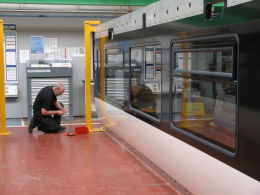Posted 13th September 2011 | 7 Comments
Now DfT is facing legal challenge over Thameslink

THE DEPARTMENT FOR TRANSPORT is facing a new challenge over its controversial decision to award the £1.4 billion Thameslink rolling stock order to Siemens rather than Bombardier.
Tha Canadian company would have built the fleet of 300 trains in Derby, and now the union UNITE has won the backing of Derby City Council in its bid to gain a judicial review.
The transport secretary Philip Hammond told the House of Commons transport select committee as recently as last week that the decision to name Siemens as preferred bidder was irrevocable, but the DfT's calculations are already under scrutiny by the National Audit Office (NAO), which is expected to publish a preliminary report into the Thameslink procurement process next month.
Although the contract with Siemens is due to be confirmed in November, this timetable could be thrown into disarray if a judicial review does go ahead.
The NAO, too, could affect the progress of the contract if its preliminary report finds flaws in the DfT's procedures. It would then mount a full inquiry into the bids and how they were evaluated, with the results due to be published early in 2012.
The DfT does have the option of abandoning the present procurement and starting again, but the transport secretary has maintained that this would delay the arrival of new trains by several years. Such a delay would have knock-on effects as well, because the present fleet of Thameslink Class 319 units is destined to be modernised and then cascaded to newly electrified lines in the north west and west of England.
Work has already started on these lines, and a serious delay in the Thameslink process could mean that no electric trains were available for them, even after the upgrades had been completed.
Reader Comments:
Views expressed in submitted comments are that of the author, and not necessarily shared by Railnews.

Duncan Jack, Pujols, France
Please could we have a British Govt. that stands up for British pêople, British jobs and British industry. It's not complicated. We pay for the politicians, can't they put a priority on us? Perhaps they don't want to be re-elected ?
T33, South of London
Excellent - the poor long suffering commuters end up with even more delays on the desperately needed trains because of the complex machinations of the Unions and the Government. These trains were supposed to be delivered in 2013 and are already delayed to 2015/6/7/8....
Rob, Nottingham, UK
Siemens won because they had a better financial package. If the Bombardier product was poor, they would not have made it to the last two.
Lutz, London
It would be a shame if the unions were allowed to win on this matter, and thus have an another inferior product imposed on commuters for the next 40 to 50 years.
David Faircloth, Derby, UK
As Bombardier are currently reserve bidder, they cannot challenge the selection of Siemens; my understanding is that under the procurement regulations, this time will come when either Bombardier are formally told they have lost the contract, or when a contract is confirmed with Siemens, should this happen before Bombardier are formally told.
The tender evaluation process for Thameslink comprises four stages; if tenderers pass through stages 1-3, then the "winner" is the tender which has the lowest net present value over a period of thirty years. So we have the ridiculous situation where firm A could come out on top in the first three stages, and also the unit cost of its train and the maintenance costs could be lower, but because it has an inferior credit rating to B, B is able to offer lower lease charges, etc over the thirty years, and this results in B winning the competition. This may have happened with Thameslink; obviously, we don't know how the bids compare on unit price and quality, but - from what has been published thus far - we know that the Siemens bid has a better NPV than the Bombardier one.
There are flaws in the tender process; the DfT has used the wrong procurement rules and Siemens should not have been allowed to bid are two examples of procedural errors, and although the invitation to tender says proven equipment must be used, the tender evaluation criteria doesn't take this into account. Also, the tender evaluation process does not take account of costs associated with closure of depots and redundancies resulting directly from the move to a PFI, and also the tender does not take account of social and environmental consequences (these are permitted under EU procurement rules). So there are lots of areas which could be considered in a Judicial review now, and this is why trade unions are taking the action they plan.
Watcherzero, Wigan
Waste of public money! Bombardier themselves arent contesting the awarding of the contract but the Lib-Con council is giving £250,000 to the UNITE union to research if theres any legal loopholes they could exploit to challenge it?
Melvyn Windebank, Canvey Island,Essex, England
Much has been made of the different credit ratings of Siemans and Bombardier and if this was the reason Bombardier was rejected then they had no chance of winning when they entered the race!!
Surely this proves it time we got back to ordering trains and not complex financial arrangements that go way beyond the time rolling stock is likely to be used for its original purpose when ordered!!